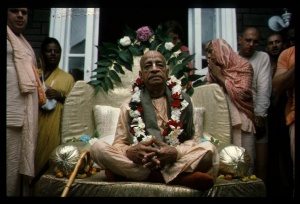CC Adi 1.43: Difference between revisions
m (1 revision(s)) |
No edit summary |
||
| Line 1: | Line 1: | ||
{{ | [[Category:Sri Caitanya-caritamrta - Adi-lila Chapter 01|C043]] | ||
<div style="float:left">'''[[Sri Caitanya-caritamrta|Śrī Caitanya-caritāmṛta]] - [[CC Adi|Ādi-līlā]] - [[CC Adi 1|Chapter 1: The Spiritual Masters]]'''</div> | |||
<div style="float:right">[[File:Go-previous.png|link=CC Adi 1.42|Ādi-līlā 1.42]] '''[[CC Adi 1.42|Ādi-līlā 1.42]] - [[CC Adi 1.44|Ādi-līlā 1.44]]''' [[File:Go-next.png|link=CC Adi 1.44|Ādi-līlā 1.44]]</div> | |||
{{CompareVersions|CC|Adi 1.43|CC 1975|CC 1996}} | |||
{{RandomImage}} | |||
==== TEXT 43 ==== | ==== TEXT 43 ==== | ||
<div | <div class="verse"> | ||
sāvaraṇe prabhure kariyā namaskāra | :sāvaraṇe prabhure kariyā namaskāra | ||
ei chaya teṅho yaiche—kariye vicāra | :ei chaya teṅho yaiche—kariye vicāra | ||
</div> | </div> | ||
| Line 12: | Line 16: | ||
==== SYNONYMS ==== | ==== SYNONYMS ==== | ||
<div | <div class="synonyms"> | ||
sa- | ''sa-āvaraṇe''—along with His associates; ''prabhure''—unto Lord Śrī Caitanya Mahāprabhu; ''kariyā''—having made; ''namaskāra''—respectful obeisances; ''ei''—these; ''chaya''—six; ''teṅho''—He; ''yaiche''—what they are like; ''kariye''—I make; ''vicāra''—discussion. | ||
</div> | </div> | ||
| Line 19: | Line 23: | ||
==== TRANSLATION ==== | ==== TRANSLATION ==== | ||
<div | <div class="translation"> | ||
Having offered obeisances unto the Lord and all His associates, I shall now try to explain these six diversities in one. | Having offered obeisances unto the Lord and all His associates, I shall now try to explain these six diversities in one. | ||
</div> | </div> | ||
| Line 26: | Line 30: | ||
==== PURPORT ==== | ==== PURPORT ==== | ||
<div | <div class="purport"> | ||
There are many unalloyed devotees of the Supreme Personality of Godhead, all of whom are considered associates surrounding the Lord. Kṛṣṇa should be worshiped with His devotees. The diverse principles are therefore the eternal paraphernalia through which the Absolute Truth can be approached. | There are many unalloyed devotees of the Supreme Personality of Godhead, all of whom are considered associates surrounding the Lord. Kṛṣṇa should be worshiped with His devotees. The diverse principles are therefore the eternal paraphernalia through which the Absolute Truth can be approached. | ||
</div> | </div> | ||
__NOTOC__ | |||
<div style="float:right; clear:both;">[[File:Go-previous.png|link=CC Adi 1.42|Ādi-līlā 1.42]] '''[[CC Adi 1.42|Ādi-līlā 1.42]] - [[CC Adi 1.44|Ādi-līlā 1.44]]''' [[File:Go-next.png|link=CC Adi 1.44|Ādi-līlā 1.44]]</div> | |||
__NOTOC__ | |||
__NOEDITSECTION__ | |||
Revision as of 17:46, 13 July 2021

His Divine Grace
A.C. Bhaktivedanta Swami Prabhupada
A.C. Bhaktivedanta Swami Prabhupada
TEXT 43
- sāvaraṇe prabhure kariyā namaskāra
- ei chaya teṅho yaiche—kariye vicāra
SYNONYMS
sa-āvaraṇe—along with His associates; prabhure—unto Lord Śrī Caitanya Mahāprabhu; kariyā—having made; namaskāra—respectful obeisances; ei—these; chaya—six; teṅho—He; yaiche—what they are like; kariye—I make; vicāra—discussion.
TRANSLATION
Having offered obeisances unto the Lord and all His associates, I shall now try to explain these six diversities in one.
PURPORT
There are many unalloyed devotees of the Supreme Personality of Godhead, all of whom are considered associates surrounding the Lord. Kṛṣṇa should be worshiped with His devotees. The diverse principles are therefore the eternal paraphernalia through which the Absolute Truth can be approached.